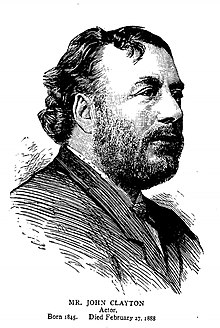John Clayton (British actor)

John Alfred Calthrop known as John Clayton (14 February 1845 – 27 February 1888) was an English actor. After building a career in a range of parts, he became best known for his roles in the farces of Arthur Wing Pinero. With Arthur Cecil he was joint manager of the Court Theatre in London from 1883 until his death, aged 43, while on tour in Liverpool.
Life and career
Early years
John Alfred Calthrop was born at
After some successful amateur experiences he made his first professional appearance on the stage on 27 February 1866, at the St James's Theatre, as George Hastings in She Stoops to Conquer. The theatrical newspaper The Era reported, "He has a good figure, and showed an easy self-possession which enabled him to acquit himself with credit". The paper added that it was doubtful if light comedy was the genre in which the debutant would make his reputation.[6]
Over the next decade Clayton appeared in a range of roles in London. At the
In July 1872 Clayton played Joseph Surface in a long-running revival of
Last years
Together with Arthur Cecil, Clayton took over the management of the Court in 1883.[11] They opened in September with a new comedy, The Millionaire by G. W. Godfrey, in which they appeared with a cast including Mrs John Wood, Marion Terry, and Mrs Beerbohm Tree.[12] After that they presented what The Pall Mall Gazette called "a series of unhealthy emotional dramas which never caught the public taste".[8] They then turned to farce, commissioning, staging and starring in Arthur W. Pinero's The Magistrate (1885), which ran for more than a year. They followed it with two more Pinero farces, The Schoolmistress (1886) and Dandy Dick (1887).[13]
The old Court theatre closed in July 1887 at the end of the run of Dandy Dick. Clayton commissioned a new building on the site from
References and sources
References
- ^ https://www.oxforddnb.com/display/10.1093/ref:odnb/9780198614128.001.0001/odnb-9780198614128-e-5575?rskey=PtHtSE&result=3
- ^ A Brief History of the Church and Parish of Gosberton in the County of Lincoln, Walter Jenkinson Kaye, jun., Elliot Stock (London), 1897, pp. 111-114
- ^ Lincolnshire Pedigrees, supplement, Arthur S. Larken, ed. Arthur R. Maddison, The Harleian Society, 1906, pp. 1173-1176
- ^ https://www.chrisbeetles.com/artists/calthrop-claude-andrew-1845-1893.html
- ^ Notes on the families of Calthorpe & Calthrop in the counties of Norfolk and Lincolnshire and elsewhere, 3rd edition, C. W. Carr-Calthrop, F. A. Perry (London), 1933, pp. 122-124
- ^ "The London Theatres", The Era, 4 March 1866, p. 11
- ^ a b c d e "Death of Mr John Clayton", The Era, 3 March 1888, p. 8
- ^ a b c d The Death of Mr John Clayton", The Pall Mall Gazette, 28 February 1888, p. 11
- ^ Notes on the families of Calthorpe & Calthrop in the counties of Norfolk and Lincolnshire and elsewhere, 3rd edition, C. W. Carr-Calthrop, F. A. Perry (London), 1933, p. 123
- ^ https://archives.uwaterloo.ca/index.php/calthrop-dion-william-palgrave-clayton-1878-1937
- ^ "Theatrical Gossip", The Era, 28 July 1883, p. 8
- ^ "'The Millionaire' at The Court", The Era, 29 September 1883, p. 5
- ^ Gaye, pp. 1530, 1534 and 1537
- ^ "Provincial Theatricals", The Era, 11 February 1888, p. 17; and "Alexandra Theatre", The Liverpool Mercury, 21 February 1888, p. 5
- ^ "Obituary", The Times, 28 February 1888, p. 5
Sources
- Gaye, Freda, ed. (1967). Who's Who in the Theatre (fourteenth ed.). London: Sir Isaac Pitman and Sons. OCLC 5997224.
